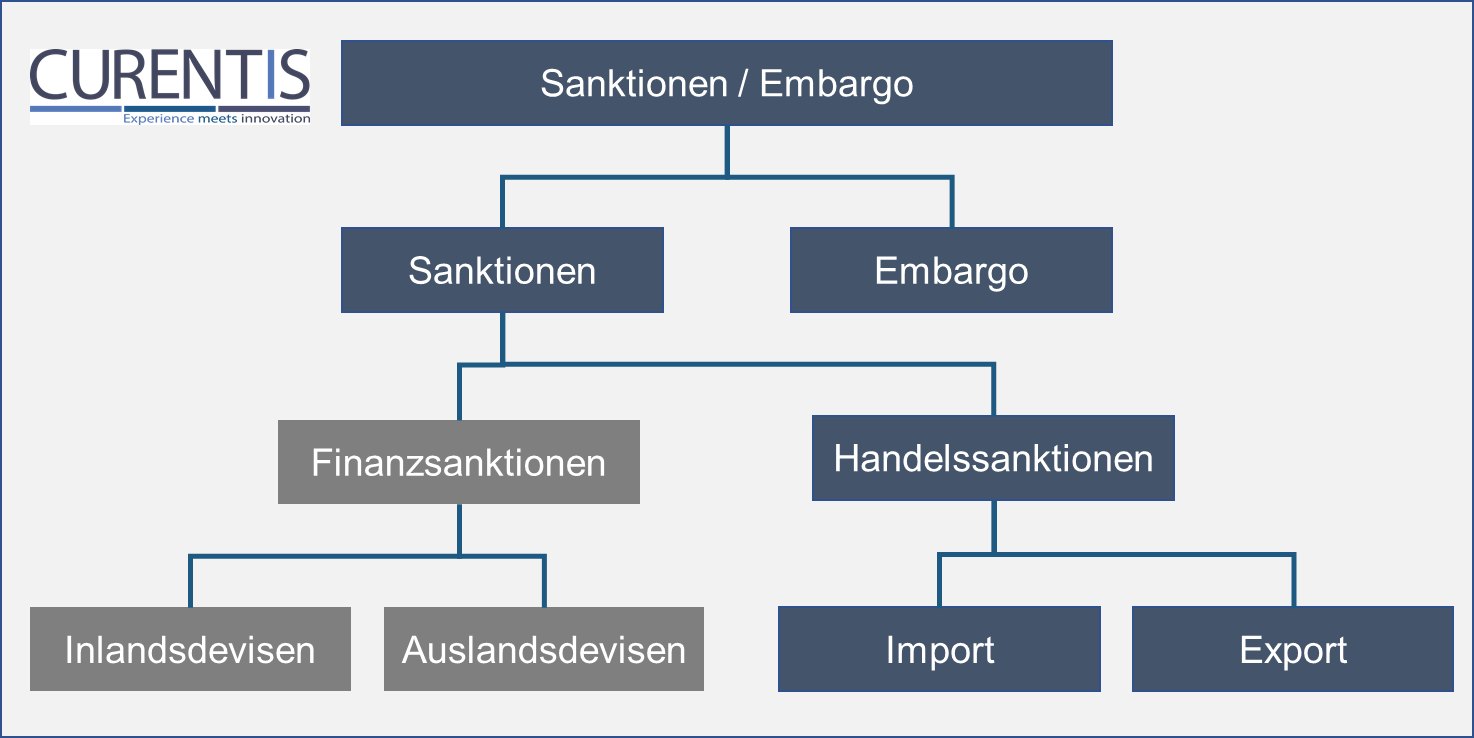Effects of trade sanctions and embargoes using the example of Cuba
Against the backdrop of the Russian attack on Ukraine and the resulting sanctions imposed by America, the EU and Switzerland, the effects and side effects of sanctions are a very topical issue. With this article, CURENTIS AG is therefore launching a series of articles on the topic of sanctions and embargoes.
In the following weeks, articles will appear on the following topics:
- Trade sanctions and embargoes
- Financial Sanctions
- Why are banks particularly in the spotlight when it comes to sanctions?
- Regulatory obligations of banks
We start the series today with a post on trade sanctions.

In this article we describe the blue highlighted topics around sanctions and embargoes related to freight transport/trade. This article will be followed by an article focusing on financial sanctions.
WHAT ARE TRADE SANCTIONS AND EMBARGOES?
Trade sanctions or embargoes are used with the aim of influencing the political decisions of the sanctioned party. In most cases, trade sanctions or embargoes target exported and imported goods of states rather than private individuals or specific companies.
A complete halt to trade with a particular country is referred to as a trade embargo. It is also often referred to as a trade embargo when economic transactions for certain goods are prohibited.
A current example is the "trade embargo" of the USA for Russian alcohol and Russian diamonds. In our understanding, however, this case is actually a sanction. Sanctions only apply to specific goods, trade sectors, individuals or companies. Accordingly, the current trade restrictions against Russia are sanctions and not an embargo, since not all economic traffic with Russia is prevented.
Sanctions or an embargo can prevent or significantly reduce exports from one country to another. In this way, the sanctioning country aims to deny the sanctioned country important goods in order to elicit a response from the sanctioned country. When sanctions prevent the import of certain goods from the sanctioned country, the purpose is to weaken the affected country's foreign sales and thereby reduce the amount of foreign exchange reserves.
In both cases, the aim is to weaken a country's economy by making valuable raw materials, needed parts, or services unavailable or more expensive to purchase from another country. In order to assess the long-term effects of a trade embargo, we consider the U.S. trade embargo against Cuba.
EXAMPLE TRADE EMBARGO CUBA
The U.S. embargo against Cuba has been in place since 1960 and has seen several tightenings and loosenings during its existence. The U.S. government under President Eisenhower at the time imposed the embargo in response to the expropriation of American companies and citizens in Cuba.
The U.S. embargo against Cuba consists of several measures. These include trade, economic and financial sanctions, known in their entirety since 1960 as the U.S. trade embargo against Cuba.
Despite its establishment in 1960, the embargo law was not passed until 1992. Named the Cuban Democracy Act as Chapter 17 of a comprehensive omnibus law, it established the trade restrictions. However, the trade embargo had already been implemented before then.
2014 and 2015 were marked by easing of trade restrictions between the U.S. and Cuba, which were pushed by President Obama. During Trump's term in office, however, these relaxations were suspended again.
The impact on the Cuban economy is difficult to quantify. There are estimates on the U.S. and Cuban sides that vary widely and are influenced by political motives.
What is clear, however, is that the Cuban economy has had to pay high adjustment costs in the short term and that the trade embargo still strongly affects Cuba's economy. Cuba's main exports are tobacco and sugar. For example, in 1926, about 60% of the sugar exporting firms were U.S. owned. These companies exported 90% of Cuba's sugar. These companies were expropriated in 1959 and nationalized by Cuba. However, these companies could now no longer export sugar to the United States. 90% of Cuban sugar exports were thus eliminated.
Through some relaxations, it is now possible to export and import certain goods, so that 5% of Cuban exports now go back to the USA.
Compared to the exports before the embargo, this is still a small number.
There is criticism of the trade embargo that questions the proportionality of the embargo. According to critics, the embargo would not affect the country's political elite, but rather the civilian population.
In fact, little has changed in the political conditions in the country since the embargo. For example, the State Department writes Cuba is a "centrally organized, socialist island state in which the leading role of the Communist Party (PCC) is enshrined by constitution." The 2021 World Hunger Index shows that Cuba is one of 18 countries with a score below 5, the worst.
As a conclusion for the trade embargo against Cuba, but also for many other trade sanctions or embargoes, it can be stated that in most cases the civilian population suffers most from the economic decline of the sanctioned country.
The special role of the EU since 1996
The European Commission adopted EU Regulation No.2271/96 on November 22, 1996. This regulation is a reaction to the embargo imposed on Cuba and makes trade between European companies and individuals with Cuba at least partially possible.
This regulation is an example of how other countries or extraterritorial organizations can help or block sanctions and embargoes. In the case of the EU regulation, the U.S. embargo is blocked.
The U.S. embargo on Cuba has also applied to foreign companies and banks seeking to do business in Cuba since the passage of the Torricelli and Helms-Burton Acts in the 1990s. Thus, a German company seeking to do business in Cuba would be just as subject to penalties from U.S. authorities as a U.S. company.
By the EU regulation Article 4 it is regulated that decisions of extra-Community courts and administrative authorities, which refer to the Torricelli and Helms-Burton laws, are not recognized and implemented in the EU.
For this, the European company must inform the EU authorities in advance and obtain confirmation from the EU Commission. In addition, European companies are guaranteed compensation in Article 6 of the EU Regulation, which covers legal costs in connection with the exemption.
It is therefore possible for European companies and banks to do business in Cuba.
However, the hurdles for such a business are still high even after the EU regulation. If the EU approval fails to materialize, the advanced costs for planning such a business are lost. This is a risk that a European company must take into account.
In addition, it will be difficult for a European company to find a financing bank that will share the risk of this transaction. Banks, while included in the EU regulation, need to be aware of potential reputational damage in the U.S. if the bank's Cuba arrangement becomes public in the U.S.
Despite the remaining risks for European companies, the German Foreign Office describes economic relations between Cuba and Germany as having improved over the past 5 years.
There is a German office for the promotion of trade and investment in Cuba. German companies are mainly represented in the energy and health sectors, as well as in the tourism industry. However, these economic relations still depend heavily on U.S. foreign policy. If the regulations surrounding the embargo were to be tightened by the U.S., this would also affect the economic relationship between the EU and Cuba. The U.S. economic embargo therefore continues to have a major impact on Cuba, even though there are now certain loopholes for European companies created by the EU Commission.
Sources:
Council Regulation (EC) No 2271/96 of 22 November 1996 on protection against the effects of the extraterritorial application of legislation adopted by a third country, and of measures based thereon or resulting therefrom
EUR-Lex - 31996R2271 - EN (europa.eu)German Federal Foreign Office:
Germany and Cuba: Bilateral relations - Federal Foreign Office (auswaertiges-amt.de)

About the Author:
As Special Matter Expert Sanctions Compliance, Mr. Jan-Ole Vietz is responsible for the news around the topic of sanctions. Together with the AFC team, he will continue to monitor global sanctions policy and summarize the most important developments for you.



